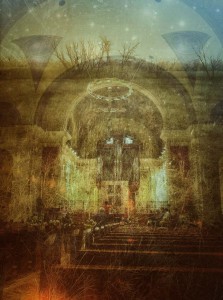
Digital Illustration by Candy Kuehn (c) 2013
The Five Books Choral Suite offers windows into some of the stories and predominant themes found in the Five Books of Moses, the Old Testament. The suite highlights humanity’s repeated efforts to realize their potential only to face failure and defeat, reflecting their ongoing struggle to find their way “out of the wilderness” as they continue the journey.
The vision for the Five Books project always included a strong choral component, and some of the movements created in Five Books: First Series – the Journey were originally written in choral version. The Five Books Choral Suite evolved out of that process, adapting those original choral movements, and including new scenes.
The Five Books Choral Suite incorporates four soloist vocal performers and a 12-person choir that breaks out into three distinct SATB groupings. The choir is accompanied by the piano in most movements, and a violin and drum join the group in the final movement.
Moses (baritone) is the storyteller, conveying the history of his people’s path, and leading them through the wilderness. The Soprano soloist represents the individual “spokesperson” for the people. The concept of deity in the Five Books Choral Suite is neither gender specific, nor gender neutral. The male bass speaks only in Hebrew, and represents the traditional male God figure; the alto singer represents a feminine divine Shekhinah figure. In most cases the alto is singing a loose translation of the bass. At times though there is a nuance where the male deity figure expresses anger and frustration at humankind’s folly and weakness, while the female expresses compassion, like two sides of the same coin.
The full Five Books Choral Suite was recorded by First Readings Project, J. David Moore, conductor, during a series of readings and recording sessions in April and June of 2013. The full Suite can be experienced here. Individual movements appear below.
and on the 7th Day
The Suite begins with and on the 7th Day, a fast paced survey through multiple unsuccessful attempts by humans to realize their potential and fulfill their destiny over many generations, only to have to start over and try again. The stories referenced are potent in our collective cultural memory, and the mere mention of names and events trigger a host of impressions, rich in implication.
Babel Lament
Babel Lament is a lamentation on the Tower of Babel story, a tale that appears in various forms in the history of several cultures. The people look back on their tremendous effort to unify and create a magnificent city with a tower reaching high into the sky, and they lament their failure to realize the dream. This interpretation is a call to join forces in unity to build something together. The story provides a context to reflect upon our history – our past attempts to unify with common purpose to accomplish something for the community – and to consider the implications of ignoring the call, or of failing in the effort.
Text is adapted from Genesis 11:3-4.
Come. Build a city, a tower in the sky.
Make a name, or scatter over the earth.One language. One purpose. Nothing out of their reach.
One language. One purpose. Nothing out of our reach.Limit their reach. Confound their speech. Scatter over the earth.
Limit our reach. Confound our speech. Scatter over the earth.
This movement is about coming together, moving beyond our differences, and setting on a unified path towards the common good. It is about the balance between pursuing our individual interests, and serving broad community goals. It is about hubris and arrogance, and about allowing our differences in culture, language, interests and purposes to define us. It is also about reaching far, even risking failure, to achieve something great.
This is a recording of Babel Lament from the April 2013 recording session with First Readings Project – J. David Moore, conductor.
Remember Babel
Movement three briefly returns to the disruptive linear character of the first movement, placing the Babel story in the context of the many other efforts of humanity to flourish and fulfill their potential.
Meditation 1: Their Cry has Reached Me
The fourth movement is a meditation on text from Exodus 3:7, as God hears the cry of the people, and acknowledges their suffering in Egypt.
I have marked well the plight of My people,
and have heeded their outcry.
I am mindful of their suffering.
Meditation 2: Tribulation
Tribulation characterizes the collective crisis of faith in the desert:
In the wilderness – Wandering.
No food – no water. No end in sight.
The people muttered against Moses, And against God.
Moses doubted himself.
God questioned the creation of humankind.
Bamidbar / in the Wilderness
In the final movement Moses coaxes everyone to dance and find joy together on the journey, whether or not they find their way out of the wilderness.
This project was made possible in part through a grant from the University of Minnesota Good Neighbor Fund and the Marcy Holmes Neighborhood Association.

This project was made possible in part with the support of
Rimon: The Minnesota Jewish Arts Council,
an initiative of the Minneapolis Jewish Federation.

This project was made possible with support from the
Howard B. and Ruth F. Brin Jewish Arts Endowment Fund,
a designated fund of the Jewish Community Foundation of the Minneapolis Jewish Federation.